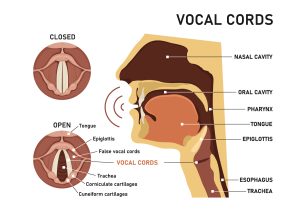TIPS AND TRICKS FOR VOCAL HEALTH
by Grace Thompson
As kids go back to school and cold and flu season encroach, prioritizing vocal health is more important than ever. Regardless if you’re a singer, most people rely on their voices a lot more than they realize whether for work or communication purposes. The voice can often feel like an intangible entity that’s simply there for us when we need it, but it is an extremely delicate, muscular function of the body. Protecting and maintaining the health of the voice is vital to all people, musician, singer, or not.
Unless you’re in vocal lessons, you may not have given much thought to the health and functions of your voice, but it is a human feature used by most each and every day. The vocal cords are thin muscular folds located in your larynx. When we go to speak or sing, they begin to vibrate against each other creating sound. The vocal cords are coated by a thin layer of mucus to keep the cords lubricated, much like oil in a machine.
Sickness, overuse and mistreatment of the voice are the most common causes of vocal stress. Allergies, sore throat, and upper respiratory infections can inflame the larynx and make it painful to speak or sing. If you find speaking to be laborious or painful, consider a slight vocal rest. Make sure to drink plenty of water and get plenty of rest. Watch out for some cold or flu medicines that can dry out your mucus.
Overuse is especially common in those who use their voice for work. Servers, teachers, public speakers and salespeople are just a few of many who use their voices professionally. If you find yourself with vocal fatigue from work, hydration and rest might not be all you need to keep your voice healthy.
*Make sure to not raise your voice in volume or pressure to be heard, and if you can, use a microphone.
*If your job has you speaking on the phone all day, don’t cradle your phone between your head and neck as this puts extra strain on the larynx.
*Find times when you can use nonverbal cues instead of speaking. Point, raise a hand, or jot down a note instead of extraneously using your voice. And most important above all, DO NOT WHISPER! Whispering causes the vocal cords to rub against each other instead of vibrate together furthering strain or irritation.
Activities such as yelling, smoking, drinking alcohol and being in high levels of air conditioning are considered mistreatment of the voice and may cause strain on the cords, or drying out of your mucus.
For singers, I find it helpful to consider our voice as a muscle just like an athlete would consider their muscles for sport. If you have only some slight irritation, it may benefit you to do very minimal, simple vocal exercises to keep your cords in movement. Much like a runner with a sore hamstring, they may walk a few laps around a track instead of a full running practice. Exercises like humming and lip trills displace pressure from the vocal cords to other parts of the face and head. Using a humidifier and eating foods high in vitamins A, C, and E will keep your mucus healthy and cords properly lubricated. Listen to your body, and if singing or speaking hurts, rest your voice. Practicing on a damaged instrument only leads to further damage.
Wherever you fall on the vocal spectrum, I hope you can take some of these tips and tricks and apply them to your speaking and/or singing life. All voices are special and unique, like paints in a paint set, and shape and color our lives, and keeping up good vocal health allows for these colors to remain vibrant and flourish.











